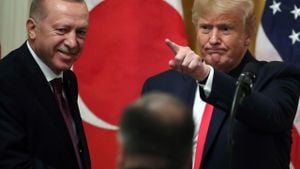John Dramani Mahama, the newly elected President of Ghana, has emphasized the weight of expectations resting upon him as he prepares to take office following his decisive victory in the December 7, 2024, presidential elections. Mahama secured 56.55% of the vote, defeating his closest rival, Mahamudu Bawumia, by over 1.6 million votes. This success marks his return to power after previously serving as president from 2012 to 2016, and the first female Vice President, Naana Jane Opoku-Agyemang, will accompany him, marking a historic moment for Ghana.
During talks with various bodies, including the UN and the Ghana Pentecostal & Charismatic Council, Mahama acknowledged the difficulties his administration will face. He stated, "We should not be too happy about the defeat of the NPP because Ghanaians are measuring with the same yardstick." This comment reflects the high standards by which the National Democratic Congress (NDC) expects to be gauged, especially after being held accountable for past performances.
Samuel Nartey George, the MP for Ningo Prampram, voiced similar sentiments on television, highlighting the immense pressures accompanying Mahama's victory. "To whom much is giving, much is expected," he said, pointing out the distinct challenges the NDC must now navigate. He emphasized the necessity for divine guidance as Mahama steps back onto the political stage, noting the significance of leading Ghana out of its current economic difficulties.
The mood surrounding Mahama’s election is both celebratory and cautious. While the NDC’s win reflects strong public support, it is also characterized by the populace's demand for swift action on pressing issues. Oliver Barker-Vormakwor, convener of the Fix the Country Movement, pointed out to Mahama, "There can be no excuses this time" for failing to address the problems faced by the nation. He emphasized the importance of treating this electoral mandate as one for significant constitutional reform and accountability—a message echoed by many Ghanaians eager for change.
Anticipated challenges include tackling Ghana’s severe economic crisis, which is marked by record inflation rates and crippling debt levels. Analysts believe the NPP’s loss was largely due to discontent with its handling of the economy, which has suffered during the past administration. Mahama will need to find solutions to the rising poverty rates, projected to hit 31.5% by 2025, and help restore the faith of the electorate, which just handed him and the NDC considerable parliamentary power.
During meetings with the United Nations and others, Mahama stressed, "We need to look at the existing programmes we need to tweak them to meet the realities of today," indicating his intention to engage with international partners soon after taking office. Discussions have already been initiated with institutions like the World Bank and the International Monetary Fund (IMF) to set the groundwork for addressing the financial crisis.
Ghana's recent elections not only reaffirm the citizens’ commitment to democratic processes but also cast light on the increased challenges awaiting the new administration. With voter turnout significantly lower than previous years, many attribute this to widespread dissatisfaction and apathy toward the existing political climate. Just over 60% of eligible voters participated, which is over 18 percentage points lower than the last election, reflecting growing disenchantment among the populace.
Despite these challenges, Mahama’s overwhelming victory provides him with what he hopes will be the political capital to affect significant changes swiftly. His leadership style, shaped by experience and past lessons, will be under scrutiny as he prioritizes initiatives laid out during his campaign. Voters are demanding action on issues such as job creation and restoration of public services, both critically needed after years of economic hardship.
Participants at recent gatherings have echoed the same message: Ghanaians are hopeful but wary. During his Thanksgiving service, Mahama remarked, "People who are considering themselves for various positions have been calling me. And I simply want to let them know, it won't be easy." His candid admission reflects the reality he must face, as he gears up for administration challenges. The anticipated call for humility and diligence among his expected appointees sends forth the message of accountability.
Mahama acknowledged the need for hard work, admitting, "I don't kid myself; it is going to be quite tough." This direct engagement with the electorate’s aspirations and his intention to maintain open communication with the public could set the tone for his administration's relationship with Ghanaians.
The situation demands not only immediate attention to pressing socio-economic issues but also long-term strategies for sustainable growth. Recall the pointed critiques against the previous administration, which faced accusations of neglecting public service and failure to effectively manage national resources. The pressure is squarely on Mahama to restore faith amid tumultuous circumstances.
Looking forward, participants from across the spectrum are eager to see if Mahama will follow through on promises of constitutional reform and accountability. Whether he can navigate the realities of governance, particularly with high public expectations and limited resources, remains to be seen. He must balance priorities as he embarks on his new role, remembering the historic responsibility he holds for the lives of millions of Ghanaians.
Nonetheless, the United Nations and other international partners have pledged support, ensuring Mahama is well-equipped to tackle the diverse challenges awaiting him as he develops and implements the strategies necessary to revive Ghana’s economic fortunes.



